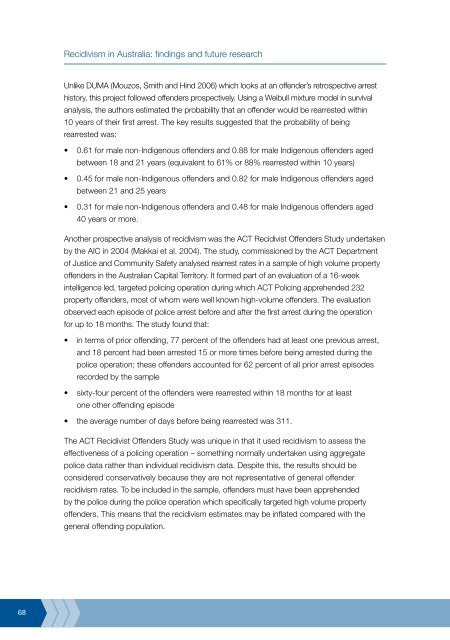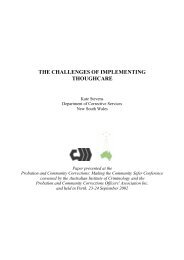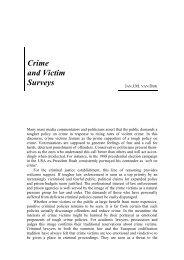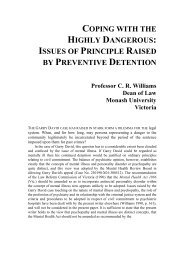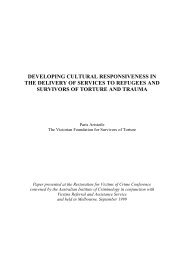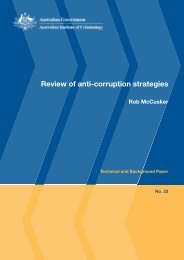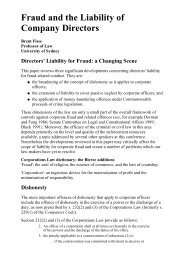Recidivism in Australia : findings and future research - Australian ...
Recidivism in Australia : findings and future research - Australian ...
Recidivism in Australia : findings and future research - Australian ...
Create successful ePaper yourself
Turn your PDF publications into a flip-book with our unique Google optimized e-Paper software.
68<br />
<strong>Recidivism</strong> <strong>in</strong> <strong>Australia</strong>: f<strong>in</strong>d<strong>in</strong>gs <strong>and</strong> <strong>future</strong> <strong>research</strong><br />
Unlike DUMA (Mouzos, Smith <strong>and</strong> H<strong>in</strong>d 2006) which looks at an offender’s retrospective arrest<br />
history, this project followed offenders prospectively. Us<strong>in</strong>g a Weibull mixture model <strong>in</strong> survival<br />
analysis, the authors estimated the probability that an offender would be rearrested with<strong>in</strong><br />
10 years of their first arrest. The key results suggested that the probability of be<strong>in</strong>g<br />
rearrested was:<br />
•<br />
•<br />
•<br />
0.61 for male non-Indigenous offenders <strong>and</strong> 0.88 for male Indigenous offenders aged<br />
between 18 <strong>and</strong> 21 years (equivalent to 61% or 88% rearrested with<strong>in</strong> 10 years)<br />
0.45 for male non-Indigenous offenders <strong>and</strong> 0.82 for male Indigenous offenders aged<br />
between 21 <strong>and</strong> 25 years<br />
0.31 for male non-Indigenous offenders <strong>and</strong> 0.48 for male Indigenous offenders aged<br />
40 years or more.<br />
Another prospective analysis of recidivism was the ACT Recidivist Offenders Study undertaken<br />
by the AIC <strong>in</strong> 2004 (Makkai et al. 2004). The study, commissioned by the ACT Department<br />
of Justice <strong>and</strong> Community Safety analysed rearrest rates <strong>in</strong> a sample of high volume property<br />
offenders <strong>in</strong> the <strong>Australia</strong>n Capital Territory. It formed part of an evaluation of a 16-week<br />
<strong>in</strong>telligence led, targeted polic<strong>in</strong>g operation dur<strong>in</strong>g which ACT Polic<strong>in</strong>g apprehended 232<br />
property offenders, most of whom were well known high-volume offenders. The evaluation<br />
observed each episode of police arrest before <strong>and</strong> after the first arrest dur<strong>in</strong>g the operation<br />
for up to 18 months. The study found that:<br />
•<br />
•<br />
•<br />
<strong>in</strong> terms of prior offend<strong>in</strong>g, 77 percent of the offenders had at least one previous arrest,<br />
<strong>and</strong> 18 percent had been arrested 15 or more times before be<strong>in</strong>g arrested dur<strong>in</strong>g the<br />
police operation; these offenders accounted for 62 percent of all prior arrest episodes<br />
recorded by the sample<br />
sixty-four percent of the offenders were rearrested with<strong>in</strong> 18 months for at least<br />
one other offend<strong>in</strong>g episode<br />
the average number of days before be<strong>in</strong>g rearrested was 311.<br />
The ACT Recidivist Offenders Study was unique <strong>in</strong> that it used recidivism to assess the<br />
effectiveness of a polic<strong>in</strong>g operation – someth<strong>in</strong>g normally undertaken us<strong>in</strong>g aggregate<br />
police data rather than <strong>in</strong>dividual recidivism data. Despite this, the results should be<br />
considered conservatively because they are not representative of general offender<br />
recidivism rates. To be <strong>in</strong>cluded <strong>in</strong> the sample, offenders must have been apprehended<br />
by the police dur<strong>in</strong>g the police operation which specifically targeted high volume property<br />
offenders. This means that the recidivism estimates may be <strong>in</strong>flated compared with the<br />
general offend<strong>in</strong>g population.


